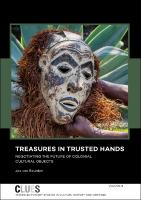Treasures in Trusted Hands
Negotiating the Future of Colonial Cultural Objects
Abstract
This pioneering study charts the one-way traffic of cultural and historical objects during five centuries of European colonialism. It presents abundant examples of disappeared colonial objects and systematises these into war booty, confiscations by missionaries and contestable acquisitions by private persons and other categories. Former colonies consider this as a historical injustice that has not been undone. Former colonial powers have kept most of the objects in their custody. In the 1970s the Netherlands and Belgium returned objects to their former colonies Indonesia and DR Congo; but their number was considerably smaller than what had been asked for. Nigeria’s requests for the return of some Benin objects, confiscated by British soldiers in 1897, are rejected. As there is no consensus on how to deal with colonial objects, disputes about other categories of contestable objects are analysed. For Nazi-looted art-works, the 1998 Washington Conference Principles have been widely accepted. Although non-binding, they promote fair and just solutions and help people to reclaim art works that they lost involuntarily. To promote solutions for colonial objects, Principles for Dealing with Colonial Cultural and Historical Objects are presented, based on the 1998 Washington Conference Principles on Nazi-Confiscated Art. They are part of a model to facilitate mediation in disputes about them. Europe, the former colonisers, should do more pro-active provenance research into the acquisitions from the colonial era, both in public institutions and private collections.
Keywords
anthropology; ethnology; museology; colonialism; colonial objects; heritage studiesPublisher
Sidestone PressPublisher website
https://www.sidestone.com/Publication date and place
Leiden, 2017Imprint
Sidestone Press DissertationsClassification
Social and cultural anthropology


 Download
Download Web Shop
Web Shop